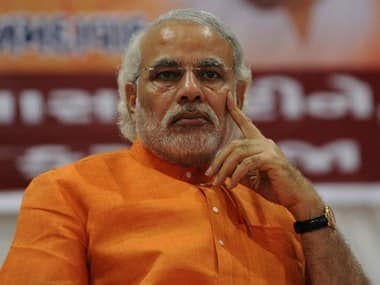So the Narendra Modi government’s first Economic Survey is being cautious about the economy’s growth prospects. It has said the economy is likely to grow in 5.4-5.9 percent range in 2014-15, with a bias towards the lower range.
It may disappoint people hoping for a miraculous recovery, but it is a realistic assessment. After all, an economy that has been in the sub 5 percent range for two years can hardly be expected to rush to a 6 percent plus growth suddenly. A measured, but sure, recovery is better than a miraculous recovery which could bring a relapse.
[caption id=“attachment_85819” align=“alignleft” width=“380”]  Prime minister Narendra Modi. AFP[/caption]
Of course this is predicated on the government doing a lot of things - and perhaps not doing a lot more. This is probably the first post-1991 Economic Survey that pitches openly and aggressively for a market economy and negligible state intervention. But that is not surprising, since the principal author - in the absence of a chief economic advisor - has been the principal economic advisor Ila Patnaik, with strong reformist credentials.
So what are the three things that the Survey wants the government to do in order to revive investment and, therefore, growth? These are targeting a low and stable inflation rate, putting public finances back on track and creating the legal and regulatory framework for a market economy.
But how realistic are its prescriptions? Economic Surveys, though they have the finance minister’s stamp of approval, often reflect the views of the chief economic advisors. Since the late 1990s, they have adopted a reformist tone, but the budgets that follow rarely took the ideas forward. This time things may be - or at least should be - different.
On the fiscal consolidation front, the Survey talks about a sharp fiscal correction and a new Fiscal Responsibility and Budget Management (FRBM) Act “with teeth”. What exactly does this mean? Would it involve penalties? On whom? Tapas Sen of the National Institute of Public Finance and Policy (NIPFP) points out that there are countries which have penalties for breaching FRBM targets, but these penalties all apply to the sub-national levels, not the federal government. There is a reason for this - states/provinces have a sovereign authority above them; federal governments do not.
In India too, the central government is in a position to wield the stick against state governments - putting conditions for loans and grants, even through the Finance Commission. But there is no authority that can do the same to the Centre. And it is not the states which need a tougher FRBM law in India - they have been far more fiscally responsible. The combined fiscal deficit of the states is just 2.2 percent and they actually have a revenue surplus. But it is worthwhile to pursue this idea and perhaps, says Sen, set tougher targets, like a sharper reduction of deficits in a shorter period.
The Survey calls upon the government to work towards a low and stable inflation rate through fiscal consolidation, moving towards establishing a monetary policy framework and creating a conducive environment for a competitive national market for food. This, it says, will reduce inflation uncertainty and restore a stable business environment.
But of the steps listed, the third could prove quite difficult, with the government having to navigate a political minefield balancing the interests of both farmers and consumers and weeding out politically influential rent seekers. Even state governments have to be taken on board here. Higher support prices and mandi prices are blamed for high food prices. In many cases, state governments levy high taxes and mandi charges as a revenue generating measure. Persuading them to give that up will not be easy.
State governments could also make or mar the third prong of the Survey’s strategy to revive investment and growth - creating a legal and regulatory framework for a market economy. There are a lot of issues that affect the business environment that lie in the realm of the state governments. The Modi government may be inclined to bring about a paradigm change in the business environment but the BJP is not in power in a majority of the states. Getting this agenda off the ground may not be as easy as it sounds.
Most surveys since the mid-nineties have adopted a rather reformist tone, pitching for labour market reforms, food economy reforms, fiscal consolidation, among other things. Most governments, however, have not implemented these suggestions. This time could be different for two reasons. One, the situation is so bad that urgent reforms are needed. Two, this government has been making reformist noises from the outset. The test of its sincerity is now.


)
)
)
)
)
)
)
)
)



